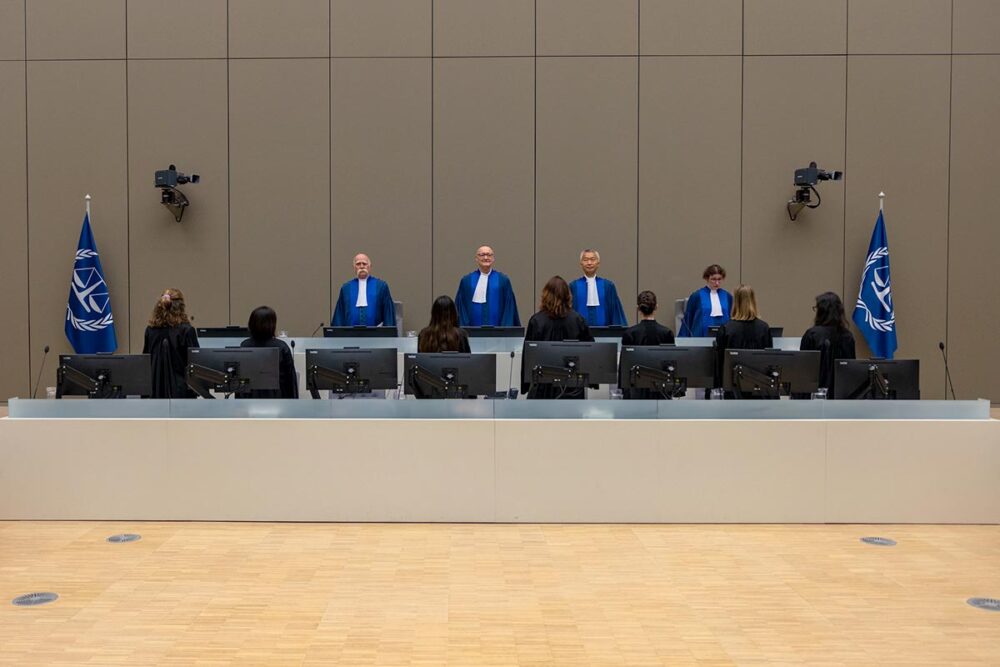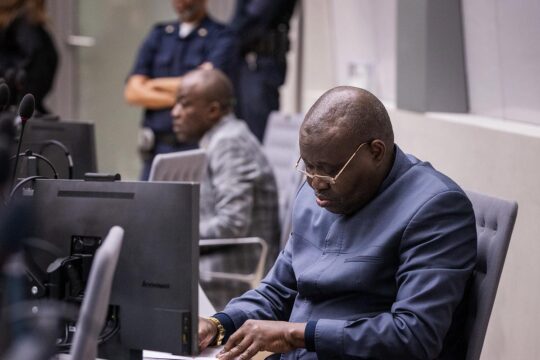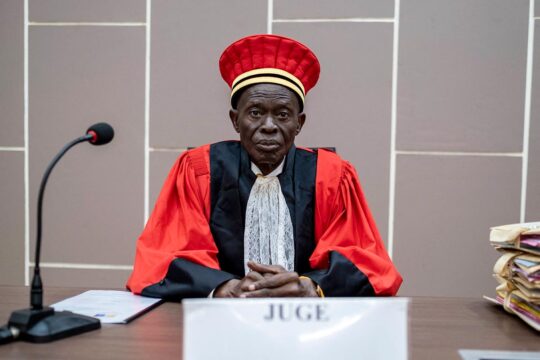It's more than a year since a judgment was last delivered at the International Criminal Court (ICC). And much has changed. The court has gained focus beyond Africa, it has managed to secure its first non-African prisoner – the former president of the Philippines Rodrigo Duterte –, it has borne disruptive cyber-attacks, the prosecutor is on leave while being under investigation for alleged sexual misconduct, and under US sanctions alongside four judges because they allowed arrest warrants against two Israeli leaders, including Prime Minister Benjamin Netanyahu. The court finds itself at the centre of many international conversations about accountability for current atrocities in Ukraine, Sudan, and Palestine. But meanwhile, there’s a thin tail of older cases to be mopped up, including the Alfred Yekatom and Patrice-Edouard Ngaïssona trial which concerns events in the Central African Republic (CAR) more than 10 years ago.
“This whole trial stands for so many of the ongoing debates around the court including the prosecutor's rhetoric versus what they can ever actually prove,” notes Lucy Gaynor of the Dutch Institute for War, Holocaust and Genocide Studies (NIOD). “The CAR is a widespread conflict, but these are small, provable charges within a much wider conflict. And that is what they are able to do in detail, as we can see from the length of the judgment” which runs to 1,616 pages. The court has only one ongoing trial, so this nearly final act of a “long and complex and complicated case,” as the court likes to repeat, with 174 witnesses and nearly 20,000 items of evidence, according to presiding judge Bertram Schmitt, played out to a full gallery in The Hague on July 24, and live streaming to viewers in the Central African Republic.
The case dealt with the bloody events of 2013 and 2014 in CAR, when a grab for power by a mainly Muslim group called the Seleka provoked a violent backlash from groups which coalesced into the anti-Balaka militia. The two men faced multiple charges for their roles as financiers and coordinators of the anti-Balaka forces. The prosecutor charged them with war crimes and crimes against humanity including murder, torture, forcible transfer, imprisonment and persecution as co-perpetrators of a common plan.
The trial had dragged on over the Covid period, recalls Gaynor: “It was so stop-start, with many sessions that were cancelled.” Eventually it took four and half years to complete the trial and reach a verdict. All three of the judges - other than the alternate judge - have outlasted their terms, “so they're here still purely for this trial, as kind of ghost judges doing this as a swan song”.
A “holistic” approach of evidence
The court found Ngaïssona guilty on 28 counts, including murder, torture, persecution, and the forcible transfer of Muslim civilians. Yekatom was found guilty on 20 charges of similar offenses, such as murder, torture, and assaults on civilians.
The defence had argued strongly that - for example - Facebook material and call data records should not be trusted. But Alexander Heinze, acting professor of International Criminal Law at Bremen University and lecturer at the University of Göttingen, notes the judges viewed the material “within the context of other evidence,” giving the chamber more flexibility to rule on admissibility. “I don't want to accuse the chamber of creating an evidentiary black box here, because I can read the thorough analysis,” he says, but “if this is the tendency for the future, that we have thousands of pages of documents and evidentiary analysis within the holistic approach, then you create sort of a black box where it's not possible anymore for the defence to challenge the findings of the chamber.”
Apart from the admissibility challenges, the defence had also claimed there were violations by the prosecution of the protocols on interviewing or prepping witnesses and on disclosure obligations. “But those critiques didn't appear a lot in the judgment,” notes Heinze, with only a couple of mentions. In fact, the judges dismissed many of these arguments in relation to sentencing, he notes, “with one sentence: ‘the chamber is not persuaded that any of the alleged violations should be considered in mitigation’. That's it. Done”.
The judges spent some time considering defence arguments challenging alleged discrimination by their clients against the Muslim population of CAR, but they seemed unpersuaded: “To the extent that the Defence argue that the accused did not act with discriminatory intent, the Chamber recalls that the evidence establishes the contrary. First, it recalls its finding that the Anti-Balaka perceived Muslims in the CAR, due to religious and ethnic commonalities, as collectively responsible for, complicit in, or supportive of the violence and abuses committed by the Seleka, and on this basis violently targeted the Muslim civilian population, specifically in the west of the CAR. In that context, the crimes the accused are convicted of were all committed for discriminatory motives, in that the Muslim civilian population was targeted because of its perceived religious and ethnic commonalities with the Seleka. Most importantly, it recalls its findings that Mr Yekatom and Mr Ngaïssona knew about and shared the Anti-Balaka’s perception of Muslims in the CAR and knew about their ensuing targeting of the Muslim civilian population, and that Mr Ngaïssona made his contributions fully aware that the Anti-Balaka would violently target the Muslim civilian population in the west of the CAR. The Chamber further recalls that it established that Mr Yekatom and Mr Ngaïssona themselves intended the Muslim civilian population to be targeted in relation to the crimes that took place in the context of all charged incidents”.
Not guilty on rape and child soldiers
On two charges the prosecution failed to make its case. Yekatom was charged with conscripting or enlisting child soldiers and Ngaïssona with rape. “These are the prosecutor’s two hot button issues,” says Gaynor, “gender violence and child soldiers. And they were the two issues where the judges were not having any of it.”
On alleged recruitment of child soldiers, Yekatom’s defence has gathered an impressive investigative team in the CAR to challenge the accounts presented in court, and the judges spent more than 150 paragraphs in the judgment dissecting the different witnesses proffered to support that count. “In sum, the Chamber by majority, Judge Chung dissenting, finds that it did not hear one single child under the age of 15 at the relevant time and purportedly within Mr Yekatom’s group that it found credible,” reads the judgment. In relation to one witness the Chamber found the “challenges to their reliability and authenticity well founded”. And another: “Having assessed P-2476’s testimony in light of the submissions by the parties, the Chamber finds that there are indeed significant inconsistencies when it comes to his experiences within Mr Yekatom’s group” .And another: “Having assessed V45-0001’s testimony in light of his victim application form and the other evidence received, in particular related to his identity, the Chamber finds V45-0001’s account concerning his membership as an alleged ‘child soldier’ in Mr Yekatom’s group not credible. Given the Chamber’s conclusions about his identity, it is equally unable to believe V45-0001’s account concerning his alleged membership in the Anti-Balaka. This is especially since this account is also fraught with discrepancies that he was unable to reasonably explain…the Chamber could not consider V45-0001’s evidence to have any probative value whatsoever.”
However, the judges refused to go further and discuss defence allegations of “collusion,” saying “the Chamber has no role in investigating and/or establishing such an alleged collusion at this stage”. This approach can be contrasted with the zeal with which the court has prosecuted witness tampering when allegedly committed by defence teams, for example in the first Central African trial against Jean-Pierre Bemba.
The lack of a conviction on the charge of rape against Ngaïssona will also be a blow to those wanting to see further work on sexual and gender-based crimes at the ICC. There was already specific commentary when the pre-trial chamber declined additional charges on these crimes. Even though the judges found credible evidence of serious sexual assaults, they could not ascertain with “virtual certainty” – which is the legal standard required – that Ngaïssona knew that “rape would occur in the ordinary course of the Anti-Balaka attack in Bossangoa”. Overall, says Heinze, this “confirms the case law. The accused must intend to facilitate and abet the principal crime and know that the crime will be committed with virtual certainty as a result. So that has been applied correctly and according to the jurisprudence. The only way to avoid this would be to lower the mental element of participating in those crimes – and I do not see this happening in the near future”.
The unprosecuted main players
Another noteworthy aspect of the judgment is that again other CAR political figures are named as the real leaders of the anti-Balaka movement. One is Michel Djotodia and another is Maxime Mokom. Each are mentioned – sometimes separately, sometimes together – 314 times. “I was really shocked about Mokom,” says Gaynor, considering that the court had him in custody two years ago before the prosecutor decided to not pursue charges against him. “To what extent is it acceptable for the judges to name him in absentia as this main player, when actually the ICC had this man and the charges against him could not be upheld and therefore they were withdrawn?”
The judgment was followed by the sentencing in the same session. The Prosecution had requested a joint sentence of imprisonment of not less than 22 years for Yekatom and not less than 20 years for Ngaïssona. The judges mentioned the prosecution's “persuasive” arguments that Ngaïssona, “while he is only charged as an accessory, his contributions go to a broad crime base… [n]otably, he contributed to the crimes committed by Mr Yekatom and his group as well as by the Anti-Balaka in Bossangoa, and his contributions impacted upon every aspect of the commission of the crimes”. While “[w]ith respect to Mr Yekatom, the Prosecution submits that he played a close, personal role in the commission of the crimes he is charged with, warranting a higher sentence than Mr Ngaïssona”. But in the end, Yekatom was sentenced to a total of 15 years and Ngaïssona to 12 years of imprisonment. “No one is going to be happy with that,” suggests Gaynor. “Judge Schmitt sounded quite aware that even with a lengthier explanation of judicial reasoning in the judgment, their decisions are going to be controversial, because they will not have delivered enough for victims, nor tackled the issues raised by the defence".
“It's a really emblematic trial,” she concludes. “There's the tension between what is the actual bread and butter of the ICC and what a lot of people who observe and also participate in those trials want it to be, which is something bigger, something more symbolic, something that reaches more victims. This was a real throwback judgement. It really felt like the early days of the court with the kinds of crimes and conflicts it was dealing with. This was not an unexpected outcome, but I think we all thought that by now the Court would have moved beyond some of the issues it still faced in this trial.”








